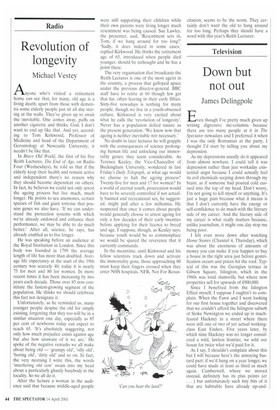Radio
Revolution of longevity
Michael Vestey
Anyone who's visited a retirement home can see that, for many, old age is a living death; apart from those with dementia some elderly people just sit all day staring at the walls. They've given up to await the inevitable. One comes away, puffs on another cigarette and thinks, God, I don't want to end up like that. And yet, according to Tom Kirkwood, Professor of Medicine and head of the Department of Gerontology at Newcastle University, it needn't be like that.
In Brave Old World, the first of his five Reith Lectures, The End of Age, on Radio Four (Wednesdays), he told us that if the elderly keep their health and remain active and independent there's no reason why they should become dependent on others. In fact, he believes we could not only arrest the ageing process but live much, much longer. He points to sea anemones, certain species of fish and giant tortoise that possess genes we also have. 'If we can understand the protection systems with which we're already endowed and enhance their performance, we may be able to do much better.' After all, science, he says, has already enabled us to live longer.
He was speaking before an audience at the Royal Institution in London. Since this body was founded in 1799 the average length of life has more than doubled. Average life expectancy at the start of the 19th century was scarcely 40; today it is nearly 75 for men and 80 for women. In more recent times it has been increasing by two years each decade. Those over 85 now constitute the fastest-growing segment of the population. He thinks we should celebrate this fact not denigrate it.
Unfortunately, as he reminded us, many younger people despise the old for simply existing, forgetting that they too will be in a similar situation one day, especially as 85 per cent of newborns today can expect to reach 65. 'It's absolutely staggering, not only how much prejudice exists against age but also how unaware of it we are.' He spoke of the negative remarks we all make about being old — 'grumpy old', 'silly old', 'boring old', 'dirty old' and so on. In fact, the very morning I write this, the words 'interfering old cow' swam into my head about a particularly ghastly busybody in the locality. So we all do it.
After the lecture a woman in the audience said that because middle-aged people were still supporting their children while their own parents were living longer much resentment was being caused. Sue Lawley, the presenter, said, 'Resentment sets in, Tom, if we hang around for too long?' 'Sadly, it does indeed in some cases,' replied Kirkwood. He thinks the retirement age of 65, introduced when people died younger, should be rethought and he has a point there.
The very organisation that broadcasts the Reith Lectures is one of the most ageist in the country, a process that galloped apace under the previous director-general. BBC staff have to retire at 60 though few get that far, often leaving in their early fifties. Sixty-five nowadays is nothing for many people, though we live in a youth-obsessed culture. Kirkwood is very excited about what he calls the 'revolution of longevity'. Never has a population defied nature as the present generation. 'We know now that ageing is neither inevitable nor necessary.'
No doubt in later lectures he will grapple with the consequences of science prolonging human life and unlocking our immortality genes; they seem considerable. As Terence Kealey, the Vice-Chancellor of, Buckingham University, wondered in last Friday's Daily Telegraph, at what age would we choose to halt the ageing process? Twenty-five for men and 17 for women? In a world of eternal youth, procreation would have to be severely controlled if not actually banned and recreational sex, he suggested, might pall after a few millennia. He suspected that once it comes about people would generally choose to arrest ageing for only a few decades of their early twenties before applying for their licence to breed and age. I suppose, though, as Kealey says, because youth would be so commonplace we would be spared the reverence that it currently commands.
In the meantime, until Kirkwood and his fellow scientists track down and activate the immortality gene, those approaching 80 must keep their fingers crossed when they enter NHS hospitals. NFR, Not For Resus citation, seems to be the norm. They certainly don't want the old to hang around for too long. Perhaps they should have a word with this year's Reith Lecturer.


























































 Previous page
Previous page